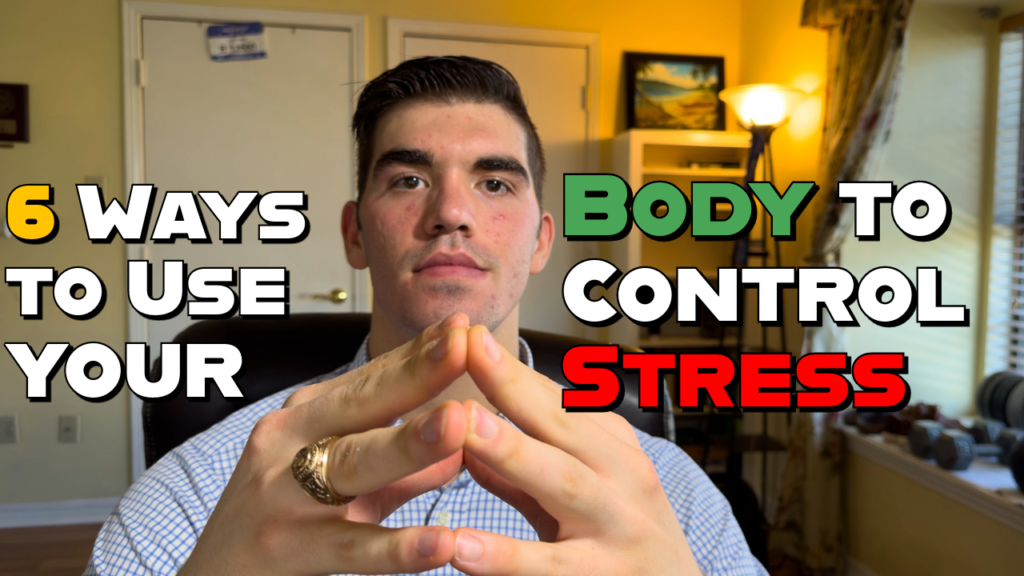What is Stress?
Stressors are a natural part of everyday life. And they can cause your body to respond in positive and negative ways. Imagine you are going for a walk in the woods and suddenly see a snake strike at you and hiss. What would happen to your body? If you perceived the stressor as threatening, your heart rate would increase, and you would release adrenaline as part of the flight or flight response. This response is totally normal for that situation to get out of the way of the bite. However, imagine instead of a snake, the stressors are constant modern life, that bill you need to pay, that check engine light, or that car that cut you off.
Why Is Stress Regulation Important?
Poor regulation of stress can contribute to feelings of inadequacy, anxiety, depression, catastrophizing, and avoidance. Chronic stress can suppress your immune system, increasing the risk of diseases such as cancer and viral infections (Dai et al., 2020). Chronic stress can also increase your heart rate and blood pressure contributing to heart disease (Kivimäki and Steptoe, 2017). So now that we know unregulated chronic stress negatively impacts our mental and physical health, what can be done about it? Fortunately, we have many healthy coping mechanisms that you can use to help control stress.
Physical Interventions
There are many low-cost interventions we can use to control stress. We will discuss simple physical interventions we can perform with our body, starting with our breath.
Breathing:
- Slowing your breath rate to <10 breaths per minute can decrease anxiety and depression (Zaccaro et al., 2018). We are constantly breathing so we can choose to use this tool to calm down the nervous system when we feel stressed.
- A simple tool is to inhale for four seconds and exhale for 4 seconds. While you do this focus on counting the numbers in your mind. Counting is important because your mind is poor at multitasking. If you are focused on counting and breathing, you are not worrying about things out of your control.
Physical Activity:
- Exercise reduces the risk of developing a mental health disorder. The more you exercise, the better your mental health will be (Smith and Merwin, 2021).
- Resistance training has been shown to improve distress tolerance and uncertainty while cardio has been shown to improve psychological distress and anxiety (LeBouthillier and Asmundson, 2017).
Resistance Exercise
- The CDC recommends at least 2 days a week of resistance exercise. This includes activities that load your bones and muscles such as weightlifting and calisthenics.
- I train 5-6 days a week in a gym setting focusing on building muscle and strength because this is what I’ve found to be enjoyable. Try out different forms of RT to find what can be sustainable for you.
- For a deep dive on resistance exercise look here.
Aerobic Exercise
- The guidelines for cardio are at least 150-300 minutes of moderate or 75 minutes of vigorous cardio a week. Additional benefits can be found beyond 5 hours of moderate physical activity a week. Blumenthal et al., (1999) found that sustaining a high heart rate with aerobic exercise for 30 minutes 3 times a week can be as effective as antidepressants in regulating mood in a population of depressed adults.
- Personally, I run 3 days a week and walk on my recovery day. There are many ways to get in your cardio, recreation leagues such as basketball and pickleball can be a great way to inject some socialization and fun. Cycling, swimming, rowing, and running are common options for aerobics. To make the exercise more enjoyable, I like to listen to audiobooks, podcasts, and music.
- For a deep dive into cardiovascular exercise, check here.
Yoga
- Yoga has been found to control markers of stress such as heart rate, inflammation, and cortisol (Pascoe et al., 2017). The physical posture and breath work you perform in yoga, asana, and pranayama, are only two of 8 parts of the yogic practice. The mental aspects of yoga may serve as a potent link to the stress-relieving effects. There are many other options such as Tai Chi which I will not discuss here, but look around in your community and take a class! You may be surprised by how good you feel.
Nutrition
- What you consume can greatly impact your mental and physical health.
- For instance, a healthy diet can reduce the risk of developing depression. Healthy diets contain vegetables, fruit, whole grains, nuts, seeds, and fish. In contrast, unhealthy diets with processed, high-fat, high-sugar foods are thought to be associated with developing depression and anxiety (Marx et al., 2017)
- Gut-Brain Axis
- There are millions of cells and bacteria that live and die every day in your GI tract. The health of these organisms depends on the quality of fuel you put in your body. When you eat, you cultivate your gut microbiome. The gut-brain axis can impact your mood and immune system by producing serotonin, dopamine, and GABA among many other substances (Margolis et al. 2021).
- Nutraceuticals
- Omega-3 fatty acids, zinc, Vitamin D, and magnesium are some nutritional supplements that have been gaining attention for their role in regulating mental health.
- Caratenoid-rich foods such as carrots, sweet potatoes, and kale were correlated with higher levels of BDNF or neuroplasticity increasing your ability to learn (Marx et al., 2017).
- Inflammation
- A Mediterranean diet is associated with reduced inflammation (Marx et al., 2017). Excessive body fat can increase inflammatory markers such as leptin, IL-6, and CRP (Heredia et al., 2012). This information is empowering because chronic inflammatory markers we develop with chronic stress. Therefore, by maintaining a healthy body fat percentage and eating a healthy diet, we can combat the effects of stress.
Sleep
- There is a dose-dependent response with greater sleep quality contributing to better mental health Scott, et al. (2021). Improving sleep quality significantly improved depression, anxiety, and stress. Current sleep recommendations vary based on age, adults require about 7-9 hours.
- How Can You Improve Your Sleep?
- Limiting naps, caffeine, drugs, and alcohol.
- Use earplugs and keep your bedroom cool and dark.
- Waking up and going to sleep at the same time every day can set your circadian rhythm and improve sleep. I personally schedule my sleep into my calendar.
- Implement a shutting-down routine an hour before bed to signify that work has ended for the day. This allows me to stop all work and wind down to ensure quality sleep.
- Viewing sunlight and exercising during the day can be effective ways to improve sleep at night. I enjoy taking my dog for a walk in the morning to get some light physical activity and sunlight.
- For a deep dive into sleep, check here.
Drugs and Tobacco
- Drugs can present a financial, physical, and mental burden on your life.
- Smoking may have a bidirectional relationship with mental illness. Smoking may cause symptoms of depression and anxiety later on. Ironically, smoking is often used as a self-medication model to alleviate stressors. (Fluharty et al., 2017).
- How to Stop Using Drugs and Smoking
- Implement replacement strategies such as chewing gum or exercising instead of going for a smoke or drinking.
- Physical activity has been shown to blunt the symptoms of smoking cessation such as restlessness, irritability, and weight gain
- Speak with a healthcare provider to consider prescription strength aids in quitting along with psychological help.
Social Support
- Social support can have a large impact on your health. For instance, Stickley and Koyanagi (2016) found that individuals with severe loneliness were 17 times more likely to have attempted suicide. This fact is heartbreaking and we know that social support can make you resilient to the impact of stressors.
- How to get more social support
- Social, cognitive, and psychological benefits can be gained by feeling supported by your friends and family. Psychological interventions may be necessary for some people to benefit from social support.
- Community involvement with peer groups, volunteering, and recreational sports can all improve social connection. I have made an effort to meet with friends and family more and have begun going to church to be part of my community. Feeling more connected may look different for each person, so even if it is going for a walk and talking with a loved one, don’t wait.
Resources:
- Sleep
- Physical Activity
- https://youtu.be/Qa-xosk6c_4
- Social Support
- Nutrition
MY KEY LINKS:
- 💡 YouTube – https://www.youtube.com/@cartergansky
- 📸 Instagram – https://www.instagram.com/carter.r.gansky/
- 🐦 Twitter – https://twitter.com/CarterGansky
- 🌲 Linktree – https://linktr.ee/cartergansky
- 🔊 Discord – https://discord.gg/sQxvHH78Ga
WHO AM I:
I’m Carter Gansky, a fitness and health advocate and a Doctor of Physical Therapy in training. I explore the strategies and tools that help us live motivating, healthier, and more fulfilling lives.
GET IN TOUCH:
🧠 contactcartergansky@gmail.com
For collaborations or other business inquiries.
References:



